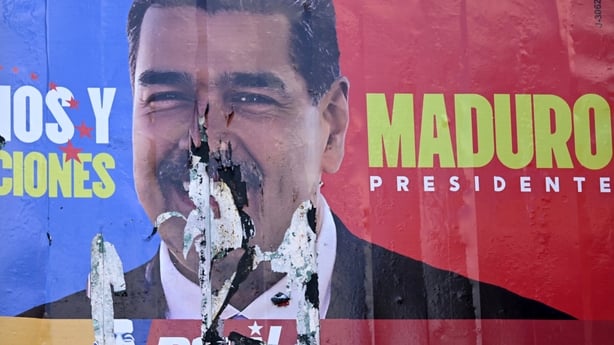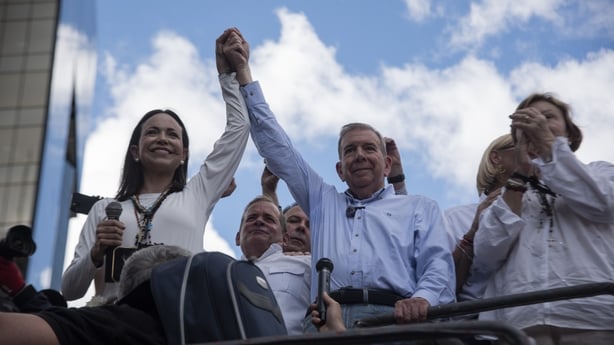Venezuelan President Nicolas Maduro said he was willing to share evidence of his election win, with international pressure mounting for him to back up a disputed victory that has sparked deadly protests.
The opposition, which claims its candidate Edmundo Gonzalez Urrutia was the rightful victor, said 16 people were killed in protests that erupted after Sunday's election in the Latin American country.
The White House warned its patience, and that of the international community, was "running out" with Venezuela, joining the European Union and regional nations in demanding a detailed breakdown of the ballots cast.
Mr Maduro said he was "ready to present 100% of the records," as he addressed reporters outside the Supreme Court of Justice where he filed an appeal against what he termed an "attack against the electoral process".
"I am willing to be summoned, questioned, investigated in all aspects by the electoral chamber as the presidential candidate who won the elections on Sunday."
The 61-year-old, who has been in office since 2013, was declared the winner with 51% of ballots cast.

The opposition says its own tally of polling-station-level results showed Mr Gonzalez Urrutia, a 74-year-old retired diplomat, had won by a wide margin.
Opposition leader Maria Corina Machado, who was replaced by Mr Gonzalez Urrutia after being barred from running, said that 16 people had been killed protesting the election result.
"This is Maduro's criminal response to the Venezuelan people who took to the streets as families, as a community, to defend their sovereign decision to be free," she wrote.
On Monday, security forces fired tear gas and rubber bullets at Venezuelans after thousands took to the streets shouting "Freedom, freedom!" and "This government is going to fall!"
Ms Machado said there had been 177 detentions and 11 "forced disappearances," while Attorney General Tarek William Saab said 749 had been arrested at protests, some of whom may face terrorism charges.
The military reported one death and 23 injuries among its ranks.
Undaunted, thousands gathered again yesterday for peaceful demonstrations of support for the opposition in several cities.
As tensions flared, National Assembly President Jorge Rodriguez, also Mr Maduro's campaign manager, said the opposition's Gonzalez Urrutia and Machado "should be arrested."
'Cannot be considered democratic' - international observers
"I want to note that our patience, and that of the international community, is running out," US National Security Council spokesman John Kirby said.
"It's running out on waiting for the Venezuelan electoral authorities to come clean and release the full detailed data on this election so that everyone can see the results."

EU foreign affairs chief Josep Borrell called for "immediate access to the voting records of polling stations" and for the government to halt "repression" of the opposition.
Colombian President Gustavo Petro - which hosts the largest number of Venezuelans who have fled economic collapse and repression at home - called for a transparent vote count under "professional international supervision".
The Carter Center, one of the few international bodies whose observers were allowed into Venezuela, said the elections "cannot be considered democratic".
The Organization of American States, a regional body with more than 30 members, charged there had been "exceptional manipulation" of the results.
Election results questioned
Mr Maduro has led the oil-rich country since 2013, presiding over a GDP drop of 80% that pushed more than seven million of once-wealthy Venezuela's 30 million citizens to emigrate.
He is accused of locking up critics and harassing opponents in a climate of rising authoritarianism.
Sunday's elections were held in the shadow of Mr Maduro's warnings of a "bloodbath" if he were to lose, and amid widespread fear the vote would be rigged.
Independent polls had predicted a convincing win for Mr Gonzalez Urrutia.
Mr Maduro's previous re-election, in 2018, was rejected as a sham by dozens of Latin American and other countries, including the United States and members of the European Union.
But years of crippling US sanctions failed to dislodge the president, who enjoys loyalty from the military leadership, electoral bodies, courts and other state institutions, as well as the backing of Russia, China and Cuba.
Peru recognized Mr Gonzalez Urrutia as Venezuela's legitimate president yesterday, prompting Venezuela to sever diplomatic ties.
Venezuela has withdrawn diplomatic staff from eight critical Latin American countries and asked envoys from those nations to leave its territory.

